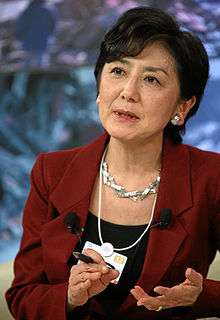Hiroko Kuniya
Hiroko Kuniya (国谷裕子, Kuniya Hiroko) (born February 3, 1957) is a Japanese news presenter and journalist. Kuniya was born in Osaka Prefecture and graduated from International School of the Sacred Heart in 1975 and then Brown University with majors in international relations and international economics. In 1981, she began to work as a news caster and writer for the English-language broadcasts of NHK television's Seven O'clock News. Starting in 1986, she served as a researcher in the United States for NHK Special. Later assignments included satellite and ground network news shows, including Asia Now (1990), which was picked up in the U.S. by Public Broadcasting Service.

Close-up Gendai
Since its inception in 1993, Kuniya hosted Close-up Gendai (Today's Close-up), which NHK airs four days weekly in prime time on its ground-based general television network, satellite, and both NHK World and NHK World Premium channels.
The Japan Times reported in January 2016 that NHK was considering making changes to the Close-Up Gendai program, which may include the removal of Kuniya as host.[1] Kuniya's eventual departure from the program in April 2016 came amid media reports of political pressure being exerted on Japanese broadcasters,[2] criticism by visiting United Nations officials investigating freedom of expression[3] and a steep decline in Japan's international ranking of press freedom by Reporters Without Borders.[4][5]
References
- "NHK may oust anchor of popular news show 'Close-up Gendai'". www.japantimes.co.jp. Kyodo News. 8 January 2016. Retrieved 8 January 2016.
- Fackler, Martin (27 May 2016). "The Silencing of Japan's Free Press". Foreign Policy. Retrieved 2020-03-05.
- Oi, Mariko (21 April 2016). "The Japanese magazine shaking up the cosy media club". BBC News Online.
- McCurry, Justin (17 February 2016). "Japanese TV anchors lose their jobs amid claims of political pressure". The Guardian.
- "Speak no evil". The Economist. 16 May 2015.
- Kuniya Hiroko at NHK